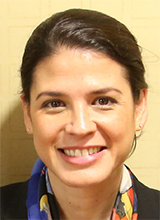Personal Statement
My area of expertise is addiction psychiatry.

My area of expertise is addiction psychiatry.


I completed my undergraduate, medical school, and residency training at the University of Washington in Seattle. I am board certified in family medicine and psychiatry with subspecialty training in addiction medicine. My clinical interests include inpatient and outpatient psychiatric consultation to primary care providers, mood disorders in pregnant and postpartum mothers, and clinical service in underserved communities.


My research aims to improve the public health impact of evidence-based behavioral health interventions for addressing comorbidities common among ethnoculturally diverse and underserved victims of trauma, including PTSD, depression, suicidal ideation, and risky substance use. I study the integration of behavioral interventions into general medical settings, with an emphasis on provider-centered training methods to support the delivery of patient-centered interventions. My current interest is in harnessing technologic innovations in machine learning and artificial intelligence, along with user-centered design, to enhance suicide prevention training scalability and sustainability.
Homepage

My research interests cover two main areas:
1) development and use of novel radioligands for positron emission tomography (PET) in CNS disorders
2) cannabinoid pharmacology, and cannabis use disorder and comorbid neuropsychiatric disorders
My VA Career Development Award (VA equivalent of an NIH K-award) focuses on the translational development of imaging neuroinflammation with PET following repetitive blast mild traumatic brain injury (mTBI). In collaboration with David Cook’s lab, imaging neuroinflammation in a mouse model of repetitive mTBI provides an opportunity to compare imaging outcomes directly with histopathology in brain tissue, which is not possible in humans. In collaboration with Elaine Peskind, imaging neuroinflammation in Veterans with mTBI and persistent post-concussive symptoms provides neuroanatomical specificity to ongoing neuroinflammation, which to date has been informed using cerebrospinal fluid and serum biomarkers. To accomplish this, my laboratory evaluates and develops established and novel PET radioligands for biomarkers of neuroinflammation. Additionally, I am interested in developing novel radioligands for druggable targets for which there are no current, suitable radioligands available. I have several ongoing collaborations with other investigators at UW and VA in which I provide support with PET imaging.
As a clinician and researcher, I am interested in how patients use cannabis for perceived therapeutic effect, and the risks and adverse outcomes resulting from substantial or chronic cannabis use. These clinical patterns can now be placed into context with a better understanding of the endocannabinoid system (ECS), which provide opportunity for more selective and safer therapeutic drug development. Due in part to the recentness of discovery of the ECS, one of my goals is to educate clinical providers on the preclinical and evidenced based research conducted to date on cannabis use and the ECS so they are better informed when discussing cannabis use with patients, and better prepared for understanding mechanisms of anticipated ECS-based medications currently under development. A second goal is to conduct research on cannabis use disorder and comorbid conditions, and identification of therapies that might better address a patient’s desired outcome from cannabis use, thereby reducing the likelihood of its associated risks.

My clinical service and research focuses on the interaction of mental and physical illness, especially in patients with chronic pain. Much of my research in recent decades has focused on the risks of treating chronic pain with opioids. I have developed educational programs and outcome tracking tools to assist with opioid treatment of chronic pain. I have published a book about patient empowerment in chronic disease care, The Patient as Agent of Health and Health Care (Oxford, 2017). I have another book written with Jane Ballantyne forthcoming, The Right to Pain Relief and other deep roots of the opioid epidemic (Oxford, 2022).
I am a Clinical Psychologist working in the Addiction Treatment Center, VA Puget Sound Healthcare System, Seattle Division since 2000. I work primarily on the Opiate Use Disorder treatment team (ATC Team 1) with both male and female Veterans on pharmacological maintenance therapy (methadone, buprenorphine, or naloxone). I am on faculty for the Seattle VA Psychology Training Program, Seattle VA CESATE Multidisciplinary Fellowship Program, and UW Psychiatry Residency Program as a clinical supervisor for psychotherapy.

Personal Statement
My career goal is to give suicidal clients and their clinicians the best chance to succeed. I have been working in the area of health services, treatment development, and clinical trials research to prevent suicide for over 20 years. My graduate training was in community/clinical psychology and focused on achieving clinical ends through prevention and other systemic interventions in socio-culturally diverse populations. I have brought these perspectives into health services research. I have developed or adapted interventions to improve care and clinician willingness to work with suicidal patients including Caring Contacts, Dialectical Behavior Therapy (DBT), Collaborative Assessment and Management of Suicidality (CAMS), and Preventing Addiction Related Suicide (PARS). I have developed an adaptation of DBT, Accepting the Challenges of Employment and Self-Sufficiency (DBT-ACES), a program to assist psychiatrically disabled individuals find and maintain living wage employment. My research has been funded by NIMH, NIDA, the Department of Defense, American Foundation for Suicide Prevention, the Department of Veteran Health Affairs, and the State of Washington.
I am the director of the Center for Suicide Prevention and Recovery (CSPAR) whose mission is to promote the recovery of suicidal individuals and the effectiveness and well-being the clinicians and families who care for them by conducting rigorous and ecologically valid research, developing innovative interventions, improving policies, systems and environments of care, and providing expert training and consultation. CSPAR faculty and staff seek a deep understanding of the cultures and settings in which we work that leads to meaningful and effective interventions ready for implementation.
In addition to clinical research, I founded the Society for Implementation Research Collaboration (SIRC) and am the PI and Director of the Military Suicide Research Consortium Dissemination and Implementation core. These organizations focus on disseminating and implementing innovative, evidence-based interventions in the systems that need them. Beyond my research, I directed the Harborview Dialectical Behavior Therapy program at Harborview Medical Center 1996-2019, co-lead the UW DBT Training Program and have a long history of training and mentoring junior faculty, fellows, psychiatry residents, pre-doctoral psychology interns, undergraduate students, and post-baccalaureate trainees. I provide psychotherapy and consultation at the UWMC Outpatient Psychiatry Clinic.

My lab’s focus is reward processing, how it differs under behavior phenotypes that are more vulnerable or resilient to mental illness and how it is changed by psychiatric pathology. Our primary focus is dopamine transmission and the circuits in which is participates.
We developed tools that allow us to track dopamine with sub-second resolution in animals over the course of months (Clark et al, Nat Methods, 2010). This approach allows us to study trajectories of precise neurochemical encoding of behaviors over the course of the development of symptomology and subsequent treatment in animal models of disease. We also have adapted this technology for intraoperative recording in humans (Kishida et al, PLoS One, 2011).
Our research highlights include contributions in the area of dopamine’s role in learning (Flagel et al, Nature, 2012), decision making (Gan et al, Nat Neurosci, 2010) and goal navigation (Howe et al, Nature, 2013). We have gleaned information on how stress impacts appetitive motivation (Wanat et al, Nat Neurosci, 2013), how adolescent alcohol use produces enhanced risk taking later in life (Clark et al, PLoS One, 2012), and identified biological mechanisms for the motivational shift in stress-induced depressive disorders (Lemos et al, Nature, 2012) and the switch to excessive drug intake in substance abuse (Willuhn et al, Nat Neurosci, 2014).
These approaches have attracted a large number of collaborations, including National Academy members Akil, Palmiter, Graybiel and Kandel.